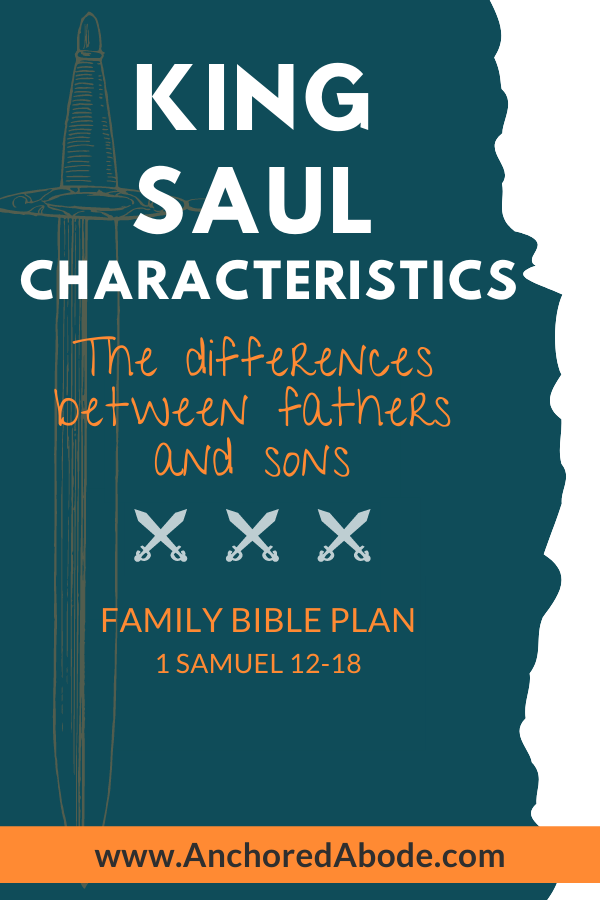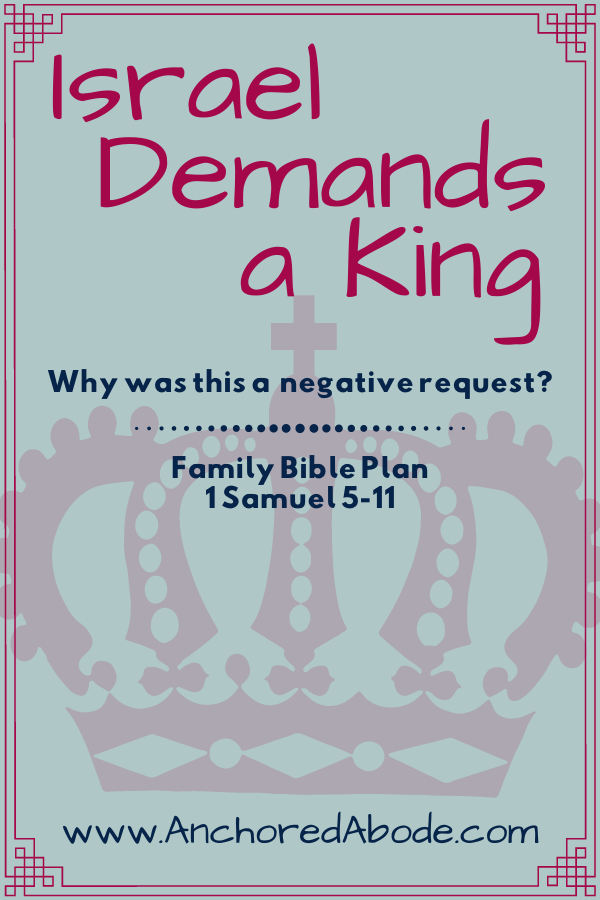Have you ever met a father and son who were polar opposites? Maybe one seemed brash and the other gentle? Perhaps one seemed a little erratic and the other logical? We find a similar contrast when we look at King Saul characteristics and his son’s characteristics.
In the beginning chapters of 1 Samuel, Eli received consequences for allowing his sons to continue in their rebellion while sitting as priests for the people of Israel. A couple chapters after that (1 Samuel 8:3) we learn Eli had a comparable relationship with his sons. Now we read about the opposite relationship conundrum.
The Bible is wrought with examples of children not following in the steps of their parents as well as those who do follow in the steps of their parents. It can go both ways from a king who seeks the Lord to have a child who chooses not to, or the less likely king who is evil whose son acts honorably.
The Spirit of God came upon him…
The Israelites had just anointed Saul as king. Typical to the time of the Judges, a warrior who led the Israelites in battle to victory became their leader. So, too, with Saul… with some extra help.
And the Spirit of God rushed upon Saul when he heard these words, and his anger was greatly kindled. He took a yoke of oxen and cut them in pieces and sent them throughout all the territory of Israel by the hand of the messengers, saying, “Whoever does not come out after Saul and Samuel, so shall it be done to his oxen!” Then the dread of the Lord fell upon the people, and they came out as one man. 1 Samuel 11:6-7, emphasis added

God was behind his success (as He is behind all of our success). It can be of great comfort to recognize that no matter the battles we face, God is behind the scenes reigning supreme. It is our great honor to give God the glory for those successes (and failures, as it may be).
There were quite a few times the Spirit of God came upon Saul with at least three occasions of Saul prophesying. (1 Samuel 10:6, 18:10, 19:23-24) This is a great example of a time when it is beneficial to have a concordance or Study Bible to decipher the meaning of Hebrew words. Our now-a-day language typically labels the word ‘prophesy’ with one definition when there are multiple possibilities.
5012. to prophesy; i.e. speak (or sing) by inspiration (in prediction or simple discourse).
God also removed His Spirit from Saul and (the text indicates) an injurious spirit was allowed to torment him.
King Saul Characteristics…
From the beginning of his reign we can see little pieces of the King Saul puzzle to fill in the details about him. While not an exhaustive list, the following provide enough evidence to see the heart of Saul from the very beginning:
- He and his servant indicate they need to go back home because his Dad would be worried (when we find out two verses later that they were also out of food and (almost) out of money) (1 Samuel 9:5-7)
- God would change Saul into a different person and give him another heart to the point he was unrecognizable by those who knew him (1 Samuel 10:6, 9-11)
- Saul does not wait for Samuel and offers up the burnt offering (1 Samuel 10:8, 13:8-10)
- There was not a trust in God for deliverance from battles (1 Samuel 13:12)
- His impatience with a looming battle won out without receiving guidance from the Lord first (1 Samuel 14:19-20)
- He makes rash oaths that he does not fulfill (1 Samuel 14:24, 38-39, 44-45)
- Then he makes his own altar (1 Samuel 14:35)
- When receiving a direct order from Samuel (ultimately a direct order from God) to destroy everything and every person in battle, Saul does not (1 Samuel 15:3, 8-11)
- After the direct defiance, Saul set up a monument honoring himself (1 Samuel 15:12)
- He lies to Samuel about carrying out the Lord’s orders, blames his soldiers and justifies their actions, then says the plunder was for the Lord, his ‘confession’ contains some self-justification and blame (1 Samuel 15:13, 15, 20-21)
- Saul’s concern rested in how HIS people would view him in light of the discipline from Samuel’s (not his) God (1 Samuel 15:30)
- Both the Israelite army and Saul were fearful of Goliath — demonstrating a lack of trust in God’s divine hand and promises (1 Samuel 17:11)
- Jealousy and anger overtook him — he was not in control of his emotions or spoke rationally (1 Samuel 18:8-9, 20:30-31)
- He tried to murder David and Jonathan (1 Samuel 18:11, 20:33)
King Saul was a man with the stature of a King but the characteristics of a man who did not know the Lord. He ended up acting like the kings of the nations, to fulfill the forewarning that an earthly king would result in detriment to Israel. They lost a great battle when they gave up the Lord as King for Saul.
Jonathan is a contrast…
Jonathan had differing characteristics and personality than his Dad, King Saul.
- While Saul was rash, Jonathan was rational.
- When Saul made oaths that he broke, Jonathan made covenants he kept.
- Where Saul followed his own knowledge in battle, Jonathan trusted the Lord to lead him to victory.
- While Saul had overwhelming jealousy, Jonathan was happy for other people’s success.
- When Saul tried to murder David (sometimes because he was a threat to the throne), Jonathan spared his life and worked to honor his Father’s successor (he knew he would not be king and that was okay with him).
- Where Saul turns on his own people, Jonathan was faithful and had loyal relationships.
That’s not to say that King Saul did not contain any positive characteristics or that Jonathan was perfect. But the Bible highlights these examples so it should be noted and reviewed. They were very different in actions, thoughts, and deeds.
Generational differences…
Only God knows the direction each person will go. As a parent, the Bible shows many examples of Biblical parents whose children did not follow in their footsteps. A child can follow in their footsteps, choose the opposite path, or follow with greater passion. The King Saul characteristics did not automatically transfer to Jonathan just because they were in the same family. The same is true today for our families.
We do not know or have control over the fate of our children’s relationship(s) with the Lord, but through our hope in our own assurance, we have a responsibility to do what we can while they are under our care to witness to them the glories of God. Not out of shame or guilt, but out of love and hope that they will have the same relationship (or a closer one with God).
That is not to say that we can wipe our hands of them as adults though. There are still opportunities to connect on a spiritual level while recognizing each other as equals: pray with and for each other, lift each other up before God, share prayer requests, do a Bible study together (long-distance is no longer a hindrance with video conferencing options), send notes of encouragement, etc.
Our primary responsibility to display God’s glory is within the walls of our homes to whomever crosses the threshold… let our children be our highest priority so that no matter the conflicting characteristics or personalities, the individual relationships with God have the opportunity and encouragement to flourish!
Last Week
Anchored Truth Tuesdays
~It is appreciated but not required that you follow my social media accounts
[DISPLAY_ULTIMATE_SOCIAL_ICONS]
~A new Anchored Abode podcast (iTunes) has been started, and I would love for subscribers and positive reviews (SoundCloud)
~I do ask that you use the Anchored Truth Tuesdays logo above on your site somewhere or on the post itself; if you click on the picture above a new window will open with html instructions
~ Family friendly posts only (I reserve the right to delete any that are deemed inappropriate); with a direct link to a specific blog post
~It is appreciated if you spread the blogging love to those around you in the Anchored community by visiting their sites, following them, or liking/sharing posts
~We have a Pinterest group board, Anchored Truth Tuesdays, where all who link up are welcome to also upload their content–you’ll just need to like Anchored Abode first, and then request to join
~By submitting a link, you are agreeing to be added to our email list as well as allowing the use of pictures/content as featured posts on our social media accounts




“Our primary responsibility to display God’s glory is within the walls of our homes to whomever crosses the threshold… let our children be our highest priority so that no matter the conflicting characteristics or personalities, the individual relationships with God have the opportunity and encouragement to flourish!” This paragraph spoke so much to me. I have always wanted to let my home be my mission field. My only job is to raise my children in the love and honor of God and to have their own relationship with him.